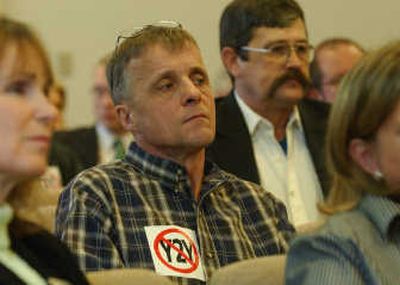‘Yellowstone-to-Yukon’ wildlife corridor goes nowhere

OLYMPIA – A bill backing a massive “Yellowstone-to-Yukon” conservation initiative has died in the Statehouse after Northeastern Washington residents trekked to Olympia to blast the plan.
“I think it’s a pig,” Rep. Joel Kretz, R-Wauconda, said of the proposal. “You can put all the ribbons you want on a pig and it’s still a pig.”
Lost along with the bill is a clause that would have declared Spokane the U.S. capital of the two-nation, 502,000-square-mile “Y2Y” eco-region.
“I think they made a mountain out of a molehill,” Sen. Ken Jacobsen, D-Seattle, said of the criticism. “I thought it was a really minor bill.”
Senate Bill 5318 failed to clear the House agriculture committee before a key deadline Wednesday night. Proponents said the bill was a largely symbolic gesture of support for the value of the 2,000-mile-long wildlife corridor. It includes large swaths of Canada’s Yukon Territory, British Columbia and Alberta, as well as part of Wyoming, much of Western Montana and most of Idaho. In Washington, it includes most of the state’s northeast corner.
“We’re not about creating one big park. We have never taken away land rights,” said the initiative’s Alberta-based conservation director, Sean Britt.
Stretching from west-central Wyoming to just south of the Arctic Circle, Y2Y is the second largest animal migration corridor in the world, Jacobsen said. It’s a precious resource, he said, with virtually all the animals and plants that were there 150 years ago.
“This region is the last great chance we have to preserve our land for wildlife and working landscapes,” Britt said. “I see it as being an interconnected landscape so animals can roam freely, can coexist with humans, and humans can keep on living on the landscape they love.”
But critics who packed a House hearing room Wednesday predicted that Y2Y will pave the way for land-use restrictions, road closures and other limits on farming, ranching and logging. Critics outnumbered proponents more than 4 to 1.
“It’s the Sovietization of Washington,” said Pete Remington, of South Bend. “Y2Y is worse than Y2K,” said Gloria Clark, of Spokane, a reference to the turn-of-the-century computing glitch.
The bill would have directed state wildlife officials to work with conservation groups and other wildlife management agencies in “cooperative programs” regarding Y2Y.
The state Department of Fish and Wildlife said it’s already doing that. It supported the bill. And the department doesn’t care if Spokane’s the capital, a spokesman said.
Still, critics decried the proposal.
“We don’t need wolves in our backyard and grizzlies in our front yard,” said Larry Campbell, an Okanogan rancher. “Don’t hand over purple mountains’ majesty and fruited plains to environmentalists who put biota and bugs above humans.”
A handful of supporters defended the plan, echoing Britt’s repeated assurances that the Y2Y is no threat to the people living on the land.
Urbanization is causing the squeeze on wildlife, not rural working lands, said Olympia’s Carolyn Dobbs. And animals need a place to roam, she said.
Donna Snow, also of Olympia, said that ensuring healthy wildlife populations would draw tourists. “This is a sustainable source of revenue for our state,” she said.
“It’s an idea whose time has come,” said Albert Foster, a conservation scientist from Port Townsend, Wash. The comparisons to eco-terrorists and spotted-owl restrictions are wrong, he said.
“The fear I hear and the division in this room is so unnecessary,” he said.
Jacobsen said he, too, was stunned by the criticism. It’s far easier to keep wild-life populations healthy than to try to rebuild them after animals become endangered, he said. If that happens, he said, the federal Endangered Species Act kicks in.
“Then you have land-use restrictions,” Jacobsen said.
He said he plans to introduce the bill again next year.